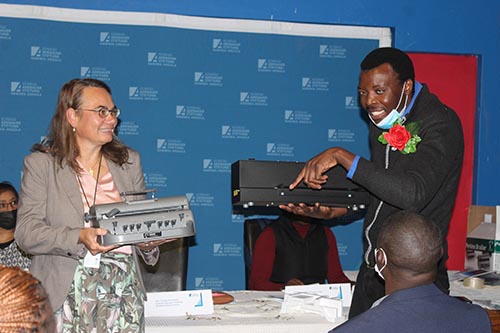Rose-Mary Haufiku
Policies that effectively include the needs of all key stakeholders will enable governments to accelerate economic and societal growth as well as development.
Director of the National Disability Council of Namibia Angelique Philander said this while shedding light on disability inclusive policies during the official handover of two Braille assistive devices from Konrad-Adenauer Stiftung (KAS) to the Namibia Federation for the Visually Impaired (NFVI).
The handover ceremony, which served as a networking platform, also aimed for stakeholders to deliberate on disability policies and inclusiveness in the workplace.
KAS donated a Perkins Braille classic manual and a tactile heat swell form machine – both valued at N$54 000.
Disability impact assessments, according to Philander, are a one-type tool that policymakers could use to examine the impact of new legislation or policies on people with disabilities, based on disability-relevant criteria.
“Disability inclusive policy decisions can have effects on persons with disabilities’ chances of becoming equal participants in society,” she said.
She also added that open and inclusive policy making is mostly promoted as a means of improving democratic performance.
It also enhances transparency and accountability and public participation, and it builds civic capacity.
Making policies that are open and inclusive ensures government will improve their policy performance by working with citizens, civil society organisations (CSOs), businesses and other stakeholders to deliver concrete improvements in policy outcomes and the quality of public services.
The main objective for the handover is to support the federation with equipment to aid tac braille or transfer text to braille.
KAS also wants to see the federation achieve its objectives and thus enhance the development and democratic participation in the disability sector.
In addition to the donation, the federation wants to assure the sector’s growth and support, with a particular focus on delivering information to people with visual impairments, who make up the majority of Namibia’s disability population.
Resident representative of KAS Namibia-Angola Natalie Russmann said the National Development Plan (NDPS) and the second Harambee Prosperity Plan prioritise inclusivity of all citizens to be able to contribute positively to the country’s socio-economic development.
“The Konrad-Adenauer-Stiftung (KAS) Namibia/Angola office recognises the need for inclusivity at all levels of our society – whether in regard to gender, race, employment status or physical capabilities – to name just a few,” said Russmann.
She also highlighted that through this positive collaboration, they have already started with the translation and printing of the Namibian Constitution in Braille Grade 1 and that they trust the output of their collective efforts will go a long way in ensuring access to the Namibian Constitution and other educational materials for people with visual impairments in Namibia.
Russmann also said they believe these small efforts could go a long way in enhancing Namibia’s democratic structure and promoting human rights by means of providing an opportunity for all citizens to access information and educate themselves on their basic human rights.
NFVI Braille proofreader Mwangelwa Hashiyana thanked KAS for the two machines and expressed gratitude for the amazing gesture that will allow them to have access to information.
She also said the donated devices will enable her to complete the poem she had begun.


